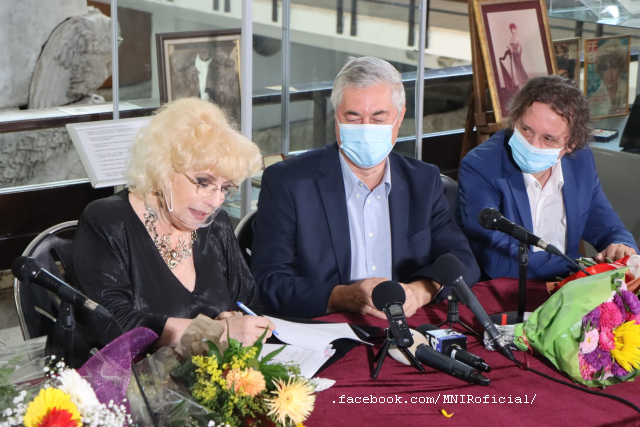Romania’s National History Museum
The Daily History Museum

Steliu Lambru, 11.10.2021, 14:00
Museums are cultural spaces,
public or private, where visitors admire objects or relive times that were
long forgotten. A museum is a time machine of sorts, an escape from the hubbub
of the daily world, from routine and from everybody’s daily chores. Also, a
museum is a place quite similar to the pilgrimage sites where people try to find answers to the questions, old and new, they ask themselves.
In a museum, we got used to coming
across portly figureheads, great army commanders, great political leaders,
cultural personalities. In a museum, we expect to witness heroic, exceptional
moments as well. But the museums are also repositories of people’s daily lives,
of the allegedly most insignificant objects people surround themselves with. As
for such a universe of the ordinary, it is no less important than that of the unique
or special objects, Ordinary objects become special, just because the passing
of time makes them special. The museums are specialized sites, yet even the big
museums, relevant for the memory of a community, can be repositories of
personal or familiar objects collections. A telling example of that is Romania’s National History Museum.
Romania’s National History
Museum was established in 1970. The museum is a continuation of a Romanian
tradition of history and archaeology museums that emerged in the second half of
the 19th century. At Romania’s National History Museum, the most
important treasures were brought. First, there were the treasures made of
precious metal. They were stored in a place where safety and visibility could
be provided. Home to the museums is one of Bucharest’s most representative
buildings. Located in the city centre, the Post Office Palace does attract
visitors due to its visibility.
However, the National
History Museum’s policy also targets the private collections, which should be
added to the already existing heritage.
Corina Chiriac is one of Romania’s
most popular entertaining music vocalists. She has recently donated personal
collection items to the National History Museum. Born in 1949, Corina is the
daughter of two musicians. Her father was a composer and an academic with the
National University of Music in Bucharest, while her mother was a pianist and
also a professor there. When the donation act was signed the Director of the
museum, Ernest Oberlander-Târnoveanu, was keen on stating that history was
equally made by ordinary people and their objects, and by the great
personalities.
History is, after
all, our life, it is everybody’s life. Our life, day by day, goes by, and turns
into history. Not everybody is aware of that, that’s for sure, but I am
convinced that through all that she does, Mrs Corina Chiriac does have this
feeling, that she belongs to history. And I can acknowledge that myself, since,
among other things, I was a listener of the songs she has performed for a
couple for decades. In the landscape of Romanian entertaining music of the 70s,
the 80s and the 90s, Mrs Corina Chiriac stands out as an unconventional character,
quite all right.
The donation made by Corina
Chiriac is also important because of the donor-artist’s notoriety, who can set an
example for other heritage owners.
Ernest Oberlander Tarnoveanu:
Mrs Corina
Chiriac belongs to a generation that managed to do a lot of things in very
difficult and complicated times. And, apart from the talent, the charisma, the
hard work she put in, Mrs Corina Chiriac also has a personality trait we should
all appreciate: she is also an aware citizen. What has happened today stands
proof of her ladyship’s responsibility towards her family, towards those who
preceded her, but also towards her won work. And I think there is no better
place for these documents to be displayed, kept and put to good use, items she
has donated to the National Museum, than this institution. This is their home, and
I would be very happy if more fellow citizens followed the Mrs Corina Chiriac’s
example. We herewith have the proof that we’re dealing with a great artist,
with a free individual, with someone who is responsible for the heritage she
received and who believes that such an institution as the National Museum is
the best place for the objects to be kept and displayed.
Corina Chiriac made a clean breast
out of it: her museum-related childhood memories and the desire to share
part of the personal treasure with other people prompted her to opt for the
donation.
Corina Chiriac:
For a whole
year I prepared for that, thinking of what I should do with all these objects that
are so very important for me. And I realized that, after a life of journeys,
with my parents or on my own, through the museums of the world, their place was
not at home in a folder, but somewhere in a museum. I knocked at the door of
the museum asking them whether they wanted an act of donation dated 1915, with
an embossed stamp and with king Ferdinand’s portrait? I told them I was also in
the possession of the baccalaureate diploma of my Armenian grandmother from
Adapazari, in Turkey, dated 1901. And, little by little, in the sweltering heat
of last summer, a team of the museum called in at my place and we started selecting
the stuff. I am very happy that especially the documents of my parents, those
of my grandparents and even mine from now on can also be viewed by someone
else, without having to invite them at my place.
Romania’s National History
Museum is also a museum of the daily history with a national scope, and beyond.
As for Corina Chiriac, she significantly contributed to the heritage of the museum.
(Translation by Eugen Nasta)






























